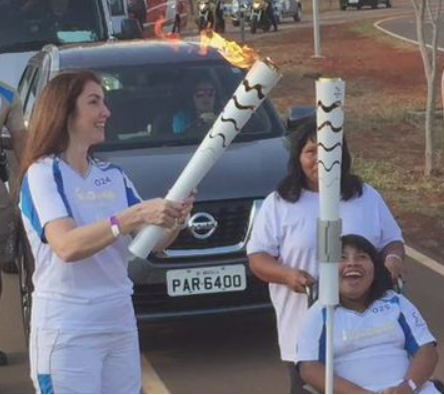A human rights organization that advocates on behalf of indigenous people groups around the world criticized organizers of the Rio 2016 Paralympic Games for depicting Brazilian tribal people as savages.
Survival International took exception to a press release announcing participants of the Paralympic Torch relay that began Sept. 1. It leads up to the international multi-sport event involving athletes with a range of disabilities being held Sept. 7-18 in Rio de Janeiro, Brazil.

Iganani Suruwaka carries the Paralympic torch Sept. 1 with the help of her mother at Parque da Cidade, a city park and popular tourist attraction in Rio de Janeiro, Brazil. (Photo/Rio 2016 Paralympic Games)
The press release introduced one of the 103 torchbearers, Iganani Suruwaha, as an indigenous woman born at the Amazon Forest with cerebral paralysis whose mother “had to escape the village to avoid indigenous infanticide.”
“The child, for not being able to walk, was sentenced to death by poisoning at its own community,” the press release read. “The cultural practice is not regarded as a crime by Brazilian authorities.”
The press release went on to describe “Muwaji’s Law,” draft legislation named after the girl’s mother now before Brazil’s Senate, as seeking “to combat harmful traditional practices at indigenous communities — such as infanticide or homicide, sexual abuse, individual or collective rape, slavery, torture, abandonment of people in need and domestic violence — and seek to guarantee the protection of basic rights for indigenous people.”
The proposed law requires anyone who is aware of “considered risk of pregnancy” or “children at risk of death by poisoning, burial, malnutrition, ill-treatment or otherwise” to report the information to authorities.
The bill addresses practices alleged in a 30-minute documentary Hakani, produced by the U.S.-based missionary group Youth With A Mission in 2008, claiming the Brazilian government is turning a blind eye to the killing of babies born with birth defects, many of which are treatable by western medicine.
Survival International, which describes itself as the “only organization that champions tribal peoples around the world,” says the law is “being promoted by evangelical missionaries as a means of breaking up tribal families.”
“The Rio 2016 organizers have made Indians out to be cruel and inhuman monsters, in the spirit of 19th century colonialist scorn for ‘brutal savages,’” Survival International Director Stephen Corry said in a press release. “Muwaji’s law represents a concerted attempt by fundamentalist missionaries to slander Indians as child-murderers, thereby making it easier to steal their children.”
Corry, a British anthropologist born in Malaysia, said it is true that some tribal individuals are “sometimes guilty of acts of horrific brutality,” but the same can be said about non-tribal individuals. He said tribal peoples are often portrayed in a negative light “simply because their communal ways are different.”
Planners of the Rio 2106 Paralympic Torch Relay said the ceremonial flame symbolizes equality and the fact “that sport can overcome social barriers of discrimination towards people with disabilities.”
Opponents of Muwaji’s Law say the bill condemns cultural traditions of 220 ethnicities living in Brazil that white people don’t understand.
